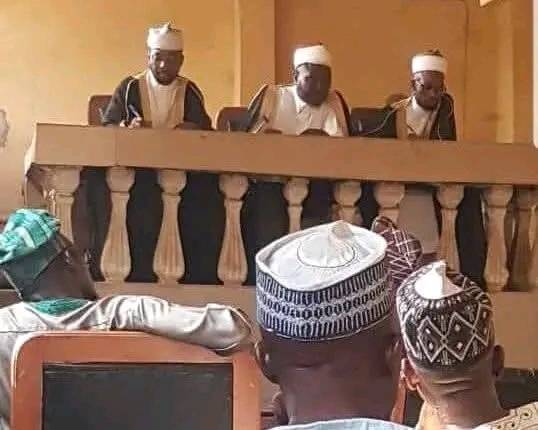he maiden public sitting of the Independent Shari’ah Arbitration Panel in Ekiti State held in Ado Ekiti to provide arbitration based on Islamic jurisprudence, has continued to elicit mixed reactions from Nigerians, coming amid the controversy over attempt to introduce Shari’ah law in South West Nigeria.
The panel, presided over by three Kadhis, Imam Abdullahi Abdul-Mutolib, Imam Abdulraheem Junaid-Bamigbola, and Dr. Ibrahim Aminullahi-Ogunrinde, adjudicated two marriage-related disputes.
In the first case, the panel’s head, Imam Abdullahi Abdul-Mutolib, announced that the couple’s dispute was resolved through a consent judgment.
This resolution was facilitated by earlier interventions from family members, which paved the way for a peaceful settlement.
However, the second case, involving allegations by a wife accusing her husband of neglecting his marital responsibilities, was adjourned until January 30 for further hearing after listening to both parties.
The panel explained that the adjournment would allow additional investigations to ensure a fair outcome.
Imam Abdul-Mutolib emphasized the importance of the couple fearing Allah and adhering to His injunctions in marriage, urging wives to be submissive to their husbands and content with their provisions.
Speaking on the panel’s significance, the President of the Supreme Council for Islamic Affairs in Ekiti State, Alhaji Hammed Bakare, emphasized that the Shari’ah adjudication process is voluntary and adheres strictly to Islamic principles.
He clarified that litigants can choose to use the Islamic Arbitration system but are not obligated to.
“Shari’ah adjudication is not compulsory for all; it is meant for Muslims or those who willingly choose to submit their grievances to it. Non-Muslims may also participate, but it remains entirely voluntary.”
Alhaji Bakare clarified.
The council’s Deputy President, Barrister Tajudeen Hammed, also highlighted that the Shari’ah panel operates in harmony with the state’s civil jurisdiction.
He stressed that its rulings are based strictly on Islamic scriptures, including the Qur’an and Hadith, and do not conflict with existing civil legal frameworks.
“Submitting grievances to the Shari’ah panel is an integral part of our faith as Muslims. However, it is not mandatory for anyone, including Muslims, to seek redress through this system”.
Barrister Hammed hailed the Kadhis for their expertise and dedication, commending their erudition in Islamic jurisprudence and their application of Qur’anic and Hadith knowledge during the proceedings.
The Shari’ah Arbitration Panel in Ekiti State was formally inaugurated by the Supreme Council for Islamic Affairs in October 2024 in Ado Ekiti. Its primary purpose is to provide a platform for resolving disputes, especially civil matters such as marriage, divorce, inheritance, etc., in line with Islamic principles for Muslims and willing participants.
Mixed Reactions
Meanwhile, the panel’s sitting continues to elicit mixed reactions on social media, with a number of commentators, mostly Christians kicking against it, while a number of Muslims have welcomed it as a good development.
While opposing the move, an X user, Máfejópamí, @VillageParrot, questioned the educational profile of Ekiti State, often touted to have most professors in the country.
“Every day I continue to question the claim that Ekiti has the highest number of professors,” he said. “From charlatan governors to voting on credit, and now this?”
Another user, AdeOtega, @ForteCorp, said the panel will die a natural death, as according to him, South West is not a Fulani republic.
“It will die a natural death, Southwest is not Fulani republic. Between you and I know that establishment of sharia court is not the end game. There’s a larger picture here.”
ᴏ̣ɴᴏ̣ᴅᴜ̣ɢᴏ̣ , @IchieOnodugo, on his part, said, “Every state in Southern Nigeria is their target. That it hasn’t started in yours yet, shouldn’t give you the voice to cheer. Guard your state, else they’ll step in.”
Joe, @joezif, shares similar views. He said, “They’ll start with something as innocuous as a marriage dispute. Then they’ll move to petty theft and recommend flogging. Finally, adultery and sentencing of accused women to death by stoning will follow. Typical behaviour of a cancer.”
Also reacting, @SirMcAwesome247 said, “This is unacceptable! On what authority is the sharia court sitting? A state can only have a Sharia court if there exists a sharia court of appeal in line with section 275 of the Constitution. SW leaders must pay attention to these subtle attempts at extremism.”
However, a number of others have welcomed it as a good development.
Reacting to the news, a user F A A R E E S, @MFaarees_, said, “Alhamdulillah! Sharia Panel is active in Ekiti State. The Panel resolved a marriage dispute in its first public sitting.”
Another user, @Ay_teey, said, “Kindly ASK All those Southerners against Shariah Law to EXPLAIN WHAT THEY UNDERSTAND BY SHARIA LAW, its Scope, jurisdiction and Ruling. Most people have no clue as to what sharia Law is and would rather stay in the dark than request for clarification or explanation.”
Also reacting, Abdulrasheed, @ab_rashiid, said, “Nice development. Sharia law should exist everywhere to serve those who demand for it. However, there shouldn’t be any attempt to enforce it on anyone over any case. As far as Nigeria is concerned, our constitution is supreme over any other law “
FOLLOW US ON:
ADVERTISE WITH US:
